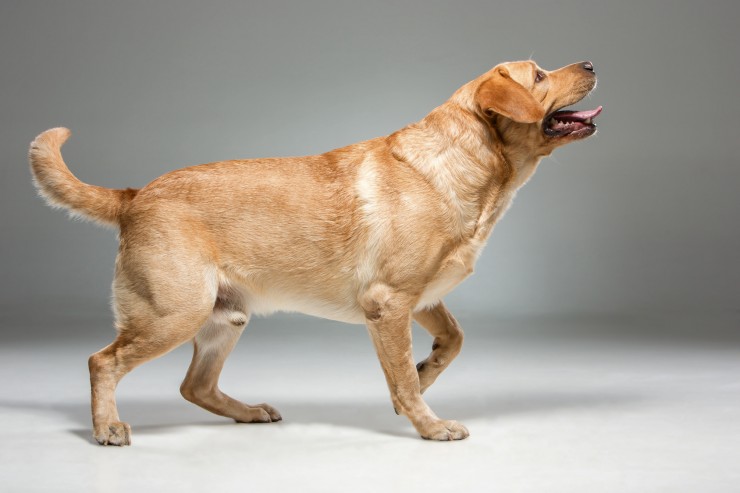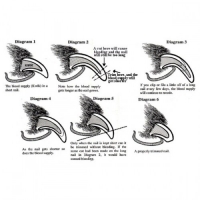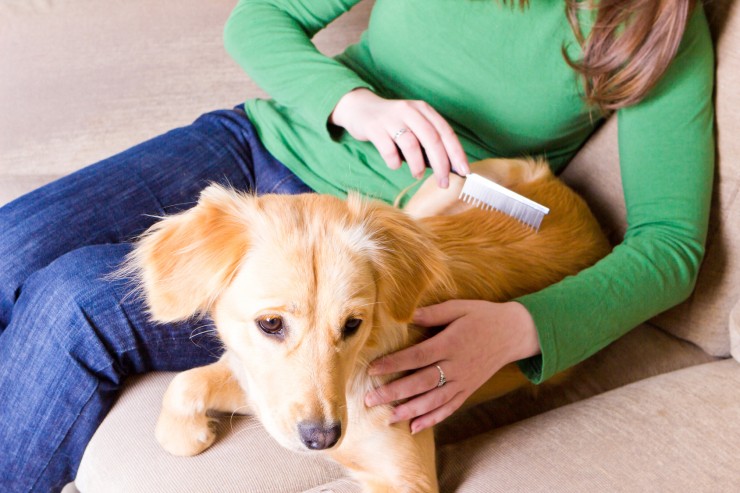
Pulling on the leash is one of the most common misbehaviors seen
on all kinds of dogs. Puppies and adult dogs alike can often be
seen taking their owners for walks, instead of the other way
around. Pulling on the leash can be much more than an annoying
habit. Leash pulling can lead to escape in the case of a break
in the collar or leash, and an out of control, off leash dog can
be both destructive and dangerous to itself and to others.
Leash pulling can result from a variety of different things. In
some cases, the dog may simply be so excited to go for a walk
that he or she is unable to control themselves. In other cases,
the dog sees itself as the leader of the pack, and he or she
simply takes the “leadership position” at the front of the pack.
If excitement is the motivation for leash pulling, simply giving
the dog a few minutes to calm down can often be a big help.
Simply stand with the dog on the leash for a couple minutes and
let the initial excitement of the upcoming walk pass. After the
initial excitement ahs worn off, many dogs are willing to walk
calmly on their leash.
If the problem is one of control, however, some retraining may
be in order. All dog training starts with the owner establishing
him or herself as the alpha dog, or pack leader, and without
this basic respect and understanding, no effective training can
occur. For dogs exhibiting these type of control issues, a step
back to basic obedience commands is in order. These dogs can
often be helped through a formal obedience school structure. The
dog trainer will of course be sure to train the handler as well
as the dog, and any good dog trainer will insist on working with
the dog owner as well as the dog.
The basis of teaching the dog to walk calmly on the lead is
teaching it to calmly accept the collar and lead. A dog that is
bouncing up and down while the collar is being put on will not
walk properly. Begin by asking your dog to sit down, and
insisting that he sit still while the collar is put on. If the
dog begins to get up, or gets up on his own after the collar is
on, be sure to sit him back down immediately. Only begin the
walk after the dog has sat calmly to have the collar put on, and
continued to sit calmly as the leash is attached.
Once the leash is attached, it is important to make the dog walk
calmly toward the door. If the dog jumps or surges ahead, gently
correct him with a tug of the leash and return him to a sitting
position. Make the dog stay, then move on again. Repeat this
process until the dog is walking calmly by your side.
Repeat the above process when you reach the door. The dog should
not be allowed to surge out of the door, or to pull you through
the open door. If the dog begins this behavior, return the dog
to the house and make him sit quietly until he can be trusted to
walk through the door properly. Starting the walk in control is
vital to creating a well mannered dog.
As you begin your walk, it is vital to keep the attention of the
dog focused on you at all times. Remember, the dog should look
to you for guidance, not take the lead himself. When walking, it
is important to stop often. Every time you stop, your dog should
stop. Getting into the habit of asking your dog to sit down
every time you stop is a good way to keep your dog’s attention
focused on you. Make sure your dog is looking at you, then move
off again. If the dog begins to surge ahead, immediately stop
and ask the dog to sit. Repeat this process until the dog is
reliability staying at your side. Each time the dog does what
you ask him to, be sure to reward him with a treat, a toy or
just your praise.
Remember that if your dog pulls on the leash and you continue to
walk him anyway, you are inadvertently rewarding that unwanted
behavior. Dogs learn whether you are teaching them or not, and
learning the wrong things now will make learning the right
things later that much harder. It is important to be consistent
in your expectations. Every time the dog begins to pull ahead,
immediately stop and make the dog sit. Continue to have the dog
sit quietly until his focus is solely on you. Then start out
again, making sure to immediately stop moving if the dog surges
ahead.
 Larger Dog Breeds That Make Great Family Pets
Larger Dog Breeds
Larger Dog Breeds That Make Great Family Pets
Larger Dog Breeds
 How To Trim A Dogs Nails Easily At Home
The majority of dog parents rely on vets or groomers to
How To Trim A Dogs Nails Easily At Home
The majority of dog parents rely on vets or groomers to
 Lhasa Apso Hereditary Health And Health Testing
Lhasa Apso Heredi
Lhasa Apso Hereditary Health And Health Testing
Lhasa Apso Heredi
 Signs You May Have Chosen The Wrong Pet Sitter
Signs You May Hav
Signs You May Have Chosen The Wrong Pet Sitter
Signs You May Hav
 Could You Offer A New Home To A Pedigree Dog?
Could You Offer A
Could You Offer A New Home To A Pedigree Dog?
Could You Offer A
Copyright © 2005-2016 Pet Information All Rights Reserved
Contact us: www162date@outlook.com